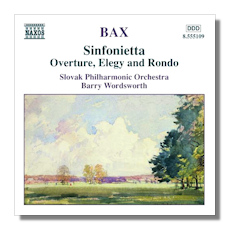
The Internet's Premier Classical Music Source
Related Links
- Bax Reviews
- Latest Reviews
- More Reviews
-
By Composer
-
Collections
DVD & Blu-ray
Books
Concert Reviews
Articles/Interviews
Software
Audio
Search Amazon
Recommended Links
Site News
 CD Review
CD Review
Arnold Bax

Rarities
- Overture, Elegy, and Rondo (1927)
- Sinfonietta (Symphonic Phantasy, 1932)
Slovak Philharmonic Orchestra/Barry Wordsworth
Naxos 8.555109 DDD 45:44
Summary for the Busy Executive: Bax deserves better.
Bax today has become the treasure of a few devoted souls, but at one time, most (and not just in his own country) considered him in the front rank of Modern symphonists. Vaughan Williams was a fan and not only dedicated his Fourth Symphony to Bax, but also went so far as to stick into the original version of his piano concerto a quote from Bax's Third Symphony. For a while, music just poured out of Bax (he wrote over eighty orchestral works alone), but in the late Thirties, he ran into a writer's block that he never really pulled out of. Some small pieces and two very fine film scores were creatively all that was left in him.
For me, Bax's work splits in two: moony and dreamy; sharply-focused. The moonstruck music tends to bore me. It doesn't necessarily taint the works Bax calls rhapsodies and "ballads" or the tone poems. One can even find it in things he calls sonatas. Essentially, he inherits the idiom and the manner from the post-Wagnerian chromaticism of the late nineteenth century, not my favorite period. Generally speaking, that part of Bax's output tends to sound like (in the phrase Vaughan Williams applied to Delius) "the village curate improvising." On the whole, the rise of Modernism, especially in the Twenties, gave a salutary boost to Bax's music. It tended to concentrate him, to force him to dig deeper into himself for better ideas, to keep a tighter grip on the course of argument. Moreover, it didn't change his basic Romanticism or the nineteenth-century rhetorical thrust of much of his music.
Both works here come after the First World War – the Overture, Elegy, and Rondo from 1927, and the Sinfonietta from 1932 – in short, mature, fully-formed Bax. Even among Bax fans, this is obscure stuff. Bax never bothered to publish the Sinfonietta (or, as he originally called it, the Symphonic Phantasy) or even to get it performed. I have no idea why. It's top-drawer Bax: three movements, played without pause, all flowering from the same motto-theme and encompassing a wide range of mood. The development is complex, but one mainly hears "emotions painted in music." The Overture, Elegy, and Rondo could easily have designated a symphony or sinfonietta. The outlines are more apparent than those of the later work, and, as Lewis Foreman's liner notes point out, the opening movement gets a lot of its vigor from the then-fashionable neoclassicism of homegrown composers like Lambert and Holst, rather than Stravinsky or Hindemith. Even with the sombre Elegy, the work as a whole leaves the impression of Bax in an extroverted humor.
I suppose Bax fans should give thanks for whatever they get. Wordsworth's is the only recording of these two pieces out there. It is just barely acceptable. The fault lies with the Slovak Philharmonic who play out-of-tune, even within orchestra sections, in the Overture, etc., and with ugly tone, to boot. Furthermore, their rhythm taps erratically. Their intonation (but not their rhythm) improves in the more complex Sinfonietta. Wordsworth is a talented conductor and often gets the players to make music with what they have, but this is one Naxos disc that correlates price with quality. The recorded sound is fine.
Copyright © 2008, Steve Schwartz




















